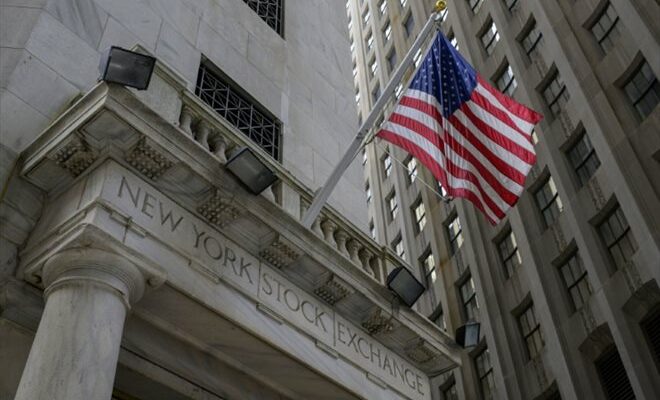The facade of the New York Stock Exchange (AFP/ANGELA WEISS)
The New York Stock Exchange ended lower on Tuesday, as concern rises on Wall Street about the possibility of a default by the United States on its debt, against a backdrop of US monetary policy still firm.
The Dow Jones dropped 0.69%, the Nasdaq index lost 1.26% and the broader S&P 500 index lost 1.12%.
“This is the first time that we have seen real nervousness (on the market) linked to the debt file”, commented Steve Sosnick, of Interactive Brokers. “We are approaching (the deadline). We are a week or two away” from a possible default by the United States.
A new meeting was held on Tuesday at the White House between President Joe Biden and elected Republican congressmen, without any significant progress having been made.
There are only nine days left before June 1, the date from which the United States may no longer be able to meet their commitments.
“And even if Biden and (Republican Speaker of the House of Representatives Kevin) McCarthy announce to us that they have reached an agreement, it still has to go through Congress, and it will not be cooked at all,” Steve warned. Sosnick.
The VIX index, which measures market volatility and investor anxiety, rose almost 8% on Tuesday.
As for the yield on US government bonds at 3 months, it reached its highest level for 22 years, at 5.29%.
Default or not, this debt crisis is already costing the United States.
On Tuesday, the US Treasury issued Treasury bills maturing on June 15, at an average rate of 5.83%, abnormally high given that the US central bank (Fed) rate is only 5, 00% to 5.25%.
Another cloud above Wall Street, the macroeconomic indicators of the day, which “suggest that the process of disinflation will soon skate”, according to Edward Moya, of Oanda.
The S&P Global PMI activity index significantly exceeded expectations and showed that both the manufacturing and services sectors were expanding in May.
Operators only see the Fed lowering its key rate once between now and the end of the year, whereas they were anticipating three reductions just a week ago.
“I don’t think the Fed is more aggressive. It’s the market that has evolved and aligned with the Fed,” argued Steve Sosnick.
This repositioning affected medium-term rates. The yield on 2-year US government bonds reached 4.40%, a first for two months.
The decline in the New York market was encouraged by the inability of the indices to cross major technical thresholds upwards, in particular the 4,200 points at the close for the S&P 500, which would be a first for nine months.
On the stock market, after leading the charge for most of the first five months of the year, the giant capitalizations of the technology sector have marked time. Alphabet (-2.05%), Microsoft (-1.84%), Apple (-1.52%) or Nvidia (-1.57%) all ended in sharp contraction.
Some representatives of the new economy escaped the gust, notably the specialist in data analysis and artificial intelligence Palantir (-6.76%), after the media fund manager Cathie Wood announced that it had bought titles of the group from Denver (Colorado).
Another survivor, the semiconductor manufacturer Broadcom (+1.20%), buoyed by the announcement of a multi-billion dollar contract with Apple, to which it will supply elements for connectivity to the 5G network.
Elsewhere, DIY chain Lowe’s (+1.72%) enjoyed better-than-expected results, although the group lowered its full-year guidance to acknowledge “lower-than-expected demand for spending not essential,” said CEO Marvin Ellison.
Already well oriented Monday, the regional bank PacWest was again sought (+ 7.74%). The course of the Californian establishment has tripled (+ 197%) since its low in early May, when it appeared as a possible victim of the banking crisis.
© 2023 AFP
Did you like this article ? Share it with your friends with the buttons below.




